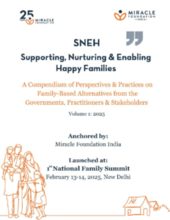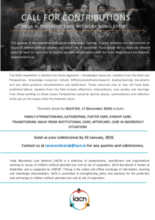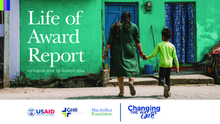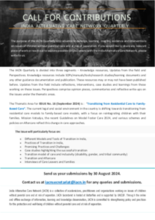childrens_living_arrangement
children_living_without_bio
Displaying 21 - 30 of 427
The SNEH: Supporting Nurturing Enabling Happy Families compendium was developed by Miracle Foundation India as part of the first National Family Summit to showcase progress, insights, and best practices in advancing family-based care and child protection reforms in India. It builds on lessons from its “Leadership Dialogue” series and collaborations with government, civil society, and care-experienced youth.
This study aimed to highlight the challenges faced by care leavers due to the absence of or inadequate aftercare support during the transition, which increases care leavers’ vulnerabilities to homelessness, unemployment, substance misuse and ruptured social relationships.
India Alternative Care Network (IACN) is calling for contributions to the 17th edition of IACN Quarterly. If you are a practitioner, academician, researcher, civil society organization, or a funder and wish to share learning, information, interventions, case studies, perspectives, and knowledge resources on children without parental care or at risk of separation, email your submission to iacnsecretariat@iacn.in on or before January 10, 2025.
The Changing the Way We Care℠ (CTWWC) Life of the Award Report highlights the initiative’s global efforts to promote safe, nurturing family care for children. Since 2018, CTWWC has been driving care reform in countries like Guatemala, Kenya, and Moldova, while supporting smaller projects in Haiti and India.
India Alternative Care Network (IACN) invites you to learn more about the mental health issues of children transitioning from institutional care to family-based care on 10 October 2024 at 3:00 - 4:30 pm on Zoom.
Midwife Siro Devi is one of several Indian midwives who were regularly pressured to murder newborn girls in India's district of Katihar during the 1990s. In this story, she is reunited with Monica, a child who was saved by Siro and her fellow midwives after being abandoned as a baby during this same period.
India Alternative Care Network (IACN) is calling for contributions to the 16th edition of IACN Quarterly.
IACN and CTWWC are inviting applications/names of the passionate and dedicated individuals, who are committed to promoting family strengthening and alternative care for children in India. This training is open for those who are committed to promoting alternative care, have been engaged in and promoting deinstitutionalization, non institutional care practices such as foster care, kinship care.
This article explores the journey of foster care in India from 2010 to 2024 as an analysis and commentary on the substantive changes between the foster care 2016 model guidelines and the newly released foster care 2024 guidelines.
Doing away with the rule that limited foster care to married couples, the Women and Child Development (WCD) Ministry has now permitted single individuals — including those who are unmarried, widowed, divorced, or legally separated — aged 35 to 60 years, to foster a child and adopt after two years, according to the recently released revised Model Foster Care Guidelines.





